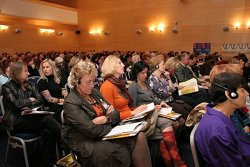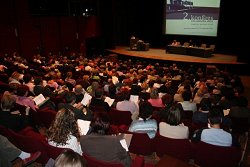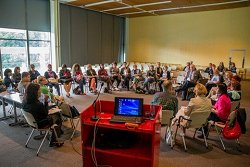introduction themes comitees programme location information links archive
12. – 14. October 2016 - 6. Congress of social work
13. October 2016 - International symposium - Programm
CONSTRUCTIVE SOCIAL WORK AS THE AGENT OF CO-CREATIVE DIALOGUE
In recent years, social work in Slovenia has found itself trapped in the vice of two circumstances of current concern that in part directly result from the last societal (economic, social, political etc.) crisis, and partly from longer-term trends in social policy that has been increasingly including the elements of neoliberalism. The first circumstance involves the changes in social legislation that are believed to be able to bring an increased efficiency and transparency in the exercise of rights to public funds. The second circumstance concerns the increasing share of people who live under the poverty threshold or experience various kinds of psycho-social distress and problems. Recently, we have been facing a new, large-scale challenge, namely: how to respond to the emerging and increasingly pressing global social issues that have become difficult to control. What we have in mind is the consequences of colonialist tendencies disguised in their modern forms and the more or less related wars, migrations, refugeeism, trafficking in persons and other forms of violence, the increasing poverty, devastation of natural resources of our planet, the ascending risk of ecological catastrophe, enhanced general imbalance of power and influence etc. These consequences of the above described circumstances present an opportunity for social work to bring together in the co-creative dialogue all actors participating in the processes of solving these complex problems, and to contribute to the development of the conditions enabling a better life for people and a fairer society.
 In the 20th century, social work has outlined its place on the map of the existing professions and scientific disciplines, and relatively homogenously defined which are the central concepts and methods, ethical principles, target action fields and research fields, and the related key tasks of our science. The break of the centuries brings a number of shifts at the epistemological, cultural, economic, political, scientific, ethical and other levels of society. Modern ideas about the world of orderliness, security and control, safety, stability, rationality, predictability, development and progress are being gradually replaced by postmodern reflections about the impossibility of catching the world's complexities in matrices, about individual and social construction of reality and the related redefinition of personal responsibility of people to act in different organisational contexts. The ecological reflection about the individual's embeddedness in broader relational systems (family, neighbourhood, workplace, group etc.) and the embeddedness of these systems in even more complex systems of socially constructed assumptions (at the level of community and at the level of systems, such as social care, health care, education, justice systems, at the level of the state, and at the global level etc.). We have to deal with the challenges presented by the interpretation of unavoidable co-dependence, mutual circular interconnectedness of all these living contexts, and again, the co-responsibility of all actors involved for the world we are creating. The aforementioned changes are sometimes defined as a dialogical shift – the understanding of the role of language in the construction of reality makes us commit to explore conversational processes, within which reality is being established, maintained and changed. Social work can play a key role as a link between the actors that participate in different interaction contexts. Modern theories of complex systems, whose functioning is described in terms of uncertainty, unpredictability and changeability, offer a new, potentially sensible and hope-inspiring framework for the understanding of human society and encouraging its development in postmodernity.
In the 20th century, social work has outlined its place on the map of the existing professions and scientific disciplines, and relatively homogenously defined which are the central concepts and methods, ethical principles, target action fields and research fields, and the related key tasks of our science. The break of the centuries brings a number of shifts at the epistemological, cultural, economic, political, scientific, ethical and other levels of society. Modern ideas about the world of orderliness, security and control, safety, stability, rationality, predictability, development and progress are being gradually replaced by postmodern reflections about the impossibility of catching the world's complexities in matrices, about individual and social construction of reality and the related redefinition of personal responsibility of people to act in different organisational contexts. The ecological reflection about the individual's embeddedness in broader relational systems (family, neighbourhood, workplace, group etc.) and the embeddedness of these systems in even more complex systems of socially constructed assumptions (at the level of community and at the level of systems, such as social care, health care, education, justice systems, at the level of the state, and at the global level etc.). We have to deal with the challenges presented by the interpretation of unavoidable co-dependence, mutual circular interconnectedness of all these living contexts, and again, the co-responsibility of all actors involved for the world we are creating. The aforementioned changes are sometimes defined as a dialogical shift – the understanding of the role of language in the construction of reality makes us commit to explore conversational processes, within which reality is being established, maintained and changed. Social work can play a key role as a link between the actors that participate in different interaction contexts. Modern theories of complex systems, whose functioning is described in terms of uncertainty, unpredictability and changeability, offer a new, potentially sensible and hope-inspiring framework for the understanding of human society and encouraging its development in postmodernity.

 The 6th congress of social work is an opportunity that (potential) co-workers in diverse projects of social work – users, experts, scientists, students, politicians, media workers etc. –can meet in a safe, collegial environment, where we can present, share and confront various experiences, views, approaches; where we can express our dilemmas and uncertainties, participate in conversations that open up possibilities to construct an agreement on where we are today in social work and where we want to go to successfully and efficiently respond to local and global challenges of co-existence in the present situation, and in our near, as well as more distant, future.
The 6th congress of social work is an opportunity that (potential) co-workers in diverse projects of social work – users, experts, scientists, students, politicians, media workers etc. –can meet in a safe, collegial environment, where we can present, share and confront various experiences, views, approaches; where we can express our dilemmas and uncertainties, participate in conversations that open up possibilities to construct an agreement on where we are today in social work and where we want to go to successfully and efficiently respond to local and global challenges of co-existence in the present situation, and in our near, as well as more distant, future.
Along with the above mentioned questions we would also like to open the congress space for discussion about the following subjects:
- Social policy and social work – influences and responses
- Between the abstract concepts and their realisation in practice
- Employment and working conditions of social workers
- Culture of protection and strengthening of resources of all the participants in the unique working projects of help, and public image of social work
- Scientific research and education for a constructive, participatory social work
You are kindly invited to join us and help us create this the central event for social work in 2016.
PROGRAMM OF INTERNATIONAL SYMPOSIUM (13. oct. 2016)
9.00 – 9.45 Plenary lecture
- Silvia Fargion:
Professional cultures and knowledge in social work - Fractures and connections in the development of social work research
9.45 – 11.15 International Symposimu Session
- Nina Mešl, Tadeja Kodele, Klavdija Kustec:
The Process of Practical Learning in Collaborative Dialogue - Lea Šugman Bohinc, Gabi Čačinovič Vogrinčič, Ana Jagrič:
Collaborative family-in-community-centred model of social work - Mari Nordstrand, Nina Schioll Skjefstad:
Perception of student supervision by agency supervisors – an exploratory study
11.15 – 11.45 Presentations of posters
- Šarka Ulčakova:
Practice of Social Work in Italian Cooperatives - Sandra Bregar:
Postopki oploditve z biomedicinsko pomočjo ter psihološko-socialno svetovanje v Sloveniji, Nemčiji ter Veliki Britaniji - Gordana Berc, Marina Milić Babić, Ivana Brlek:
The role of social workers in a re-socialization process of treated alcoholics and their families - Nataša Zlodej, Dijana Jeleč Kaker:
Vloga socialnega dela pri družinskem sestanku v okviru paliativne oskrbe
12.30 Lunch break
14.00 – 16.00 International Symposimu Session
- Andrzej Kacprzak:
Social work and imprisonment - Iwona Kudlińska:
Social policy and social work toward social problem of parental inefficacy in Poland – solution, maintenance or ‘managing’? - Hubert Höllmüller:
The diagnostic aspect of family group conferences in the practice of child and youth welfare offices - Chu-Li Liu:
Protection or Exclusion?—The Case of Domestic Violence Prevention System in Taiwan
20.30 Gala dinner